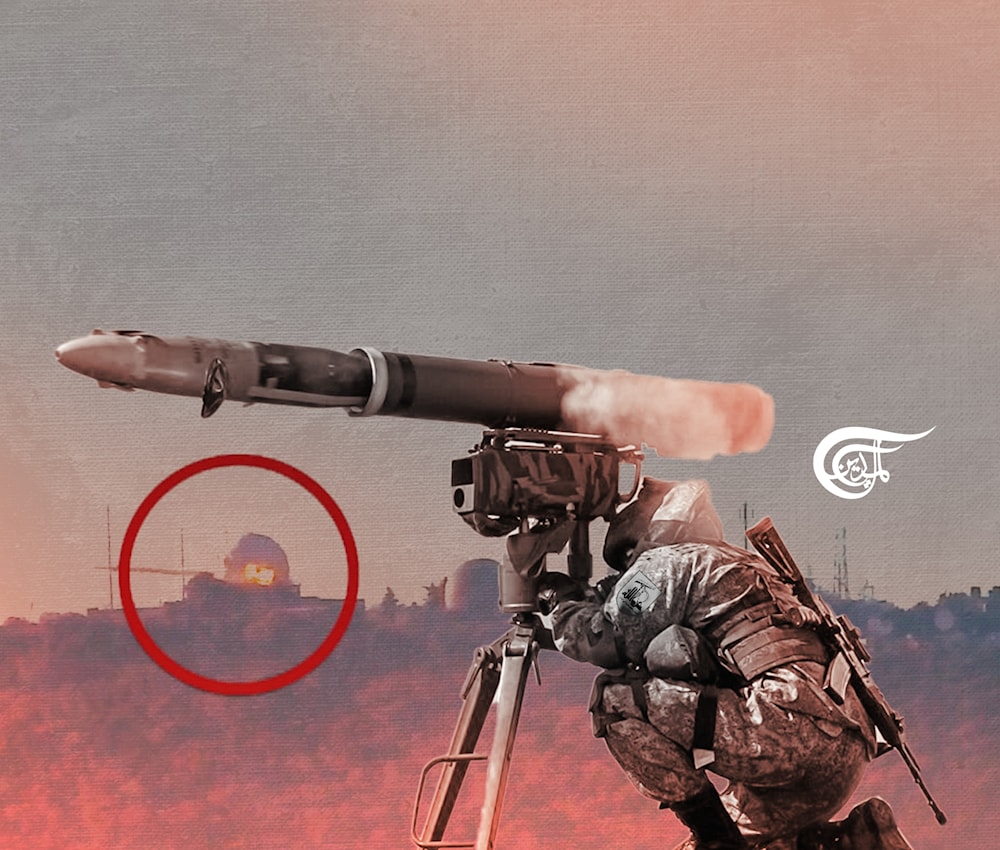Israeli regional warfare comes back to bite
Israeli illegal airstrikes signaled an official admission: that the occupation wishes to willingly extend its warfare and massacres to regional frontiers.
-

For now, the "Meron" Airbase blitz is a telling reminder that the Lebanese resistance is a formidable battlefield force once engaged (Illustrated by Mahdi Rteil to Al Mayadeen)
The Lebanese resistance recently fired dozens of rockets towards Israeli “intel” headquarters – the "Meron" Airbase – as part of a preliminary response to the Israeli assassination of Hamas commander Saleh al-Arouri on Lebanese soil. As the Israelis and its occupation backers show no signs of ceasing unmitigated bloodshed in Gaza, the former appears keen to instigate a new regional war and normalize escalation.
The Meron attack should be seen as swift and high-precision retaliation. It is the airbase that organizes, coordinates and manages all Israeli occupation air operations focused on Syria, Lebanon, Turkey, Cyprus, etc. Now it serves as an early testament to a promised response from within Lebanon, and what could follow.
By flagrantly violating Lebanon’s sovereignty, the Israelis once again commit the cardinal mistake of underestimating a potent resistance’s operational capabilities. Similarly, from Yemen to Syria, fighters are ever more vigilant and actively engaged in a protracted war, thanks to the Israeli own unmitigated bloodshed and genocide in Gaza. As a result, the aftermath of the Beirut strike only makes certain that such multifront resistance is self-induced, and here to stay.
First, Israeli violation of national sovereignties and its expanding aggression campaign can never undermine the spirit of the Palestinian resistance. Palestine’s resolve against brutal Israeli colonial aggression has only strengthened, and a widening pool of regional actors suggests the occupation is contributing to its own undoing.
On the regional front, Israeli illegal airstrikes signaled an official admission: that the occupation wishes to willingly extend its warfare and massacres to regional frontiers. This puts the burden of all destructive consequences squarely on the Israelis, further isolating an embattled entity that has its chief financier on the ropes. Israeli media has expressed fear at the Lebanese resistance’s capabilities in the aftermath of the Meron strike. The occupation also continues to hide the true extent of damage incurred from the swift retaliatory strikes. It fears exposing more vulnerabilities by bringing details to light. Above all, the Israelis are also acutely aware that the Lebanese resistance possesses detailed information about its strategically sensitive locations.
But the Israeli own transgressions in Beirut have ensured it faces swift retaliation from the very force it once succumbed to. This comes as Israelis remain grossly underprepared to put its talk into action on the battlefield. For instance, the Israelis failed to even cope with retaliatory cross-border fire from Lebanon, a response to the Israeli continued settler aggression, illegal provocations, and occupation violence. And as the Washington Post now reports, “an American intelligence assessment found that it would be difficult for the Israelis to succeed in a war against Hezbollah amid ongoing fighting in Gaza.”
The state of panic in wake of the illegal airstrike is undeniable. Look to the occupation’s chief financier, the United States, as State Secretary Antony Blinken scrambles to the Middle East to talk up so-called action to prevent war spill-overs. The dominant response so far has been for the U.S. to quit scoring appearances for the Israeli occupation, and take decisive measures that halt occupation bloodshed. All solutions run through Palestine’s Gaza, and there will be no peace or justice in defiance of that fact.
Underneath the West’s façade of diplomatic unity, Western nations are also increasingly alarmed by the formidable pressure that a multifront resistance can bring upon the occupation. Steering clear of Lebanon was a critical factor in early warnings issued by Paris to the Israelis, and EU foreign policy chief Josep Borrell recently warned that it is 'imperative' not to risk regional escalation, pointing to Israeli aggression into Lebanon.
Interestingly, Borrell also added that “we cannot continue to witness unbearable suffering for children, women, and innocent civilians.” But the EU did witness it all for months.
If suffering and massacres were truly out of the question, why didn’t the West explicitly condemn occupation genocide, cease arms supplies, and prepare swift and punitive sanctions for the Israelis' unprecedented bloodshed? Why didn’t the EU lead collective Western influence to force the occupation out of Palestinian soil? The EU has significant visibility into Israeli war crimes, its genocidal aggression, and plans to take war spillovers to regional frontiers. And yet, it presents no ultimatum to the Israelis to cease its occupation, or face the full force of consequences.
From the 2006 July war to the years that followed, Washington and the EU have also borne witness to Hezbollah’s sophisticated attacks in retaliation to Israeli forces and their settler colonial provocations. The Al-Arouri attack in Lebanon has put sovereignty front and center of future calculations. Continued Israeli belligerence could thus invite a level of escalation unseen in years, with no one else to blame. After all, the Israeli airstrike deliberately withstood warnings from Hezbollah chief Hassan Nasrallah that “any assassination on Lebanese soil against a Lebanese Syrian, Iranian or Palestinian will be met with a decisive response.”
For now, the "Meron" Airbase blitz is a telling reminder that the Lebanese resistance is a formidable battlefield force once engaged and can score clinical blows if provoked by the occupation. The longer the Israelis insist on justifying its belligerence, the more multifront resistance it engages to its peril.

 Hannan Hussain
Hannan Hussain
 5 Min Read
5 Min Read











